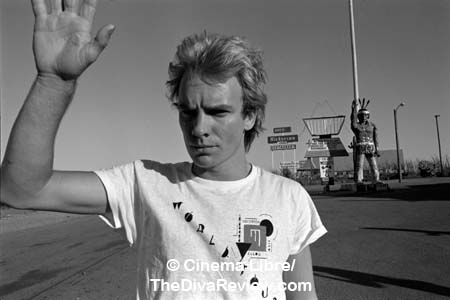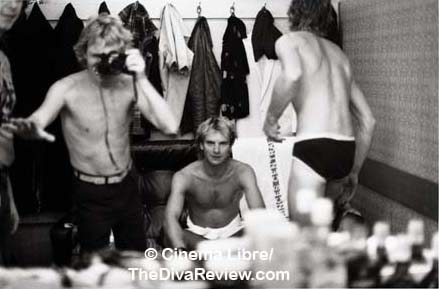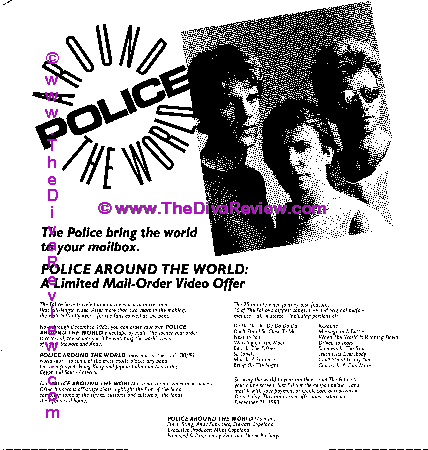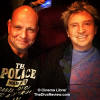
A generation ago, an adored and revered band chose to burn out rather than fade away. The 1983 breakup of The Police was a mystery and a disappointment to their fans who looked to the bandís fusion of multicultural sounds and musical proficiency on songs like "Roxanne," "Message in a Bottle," and the great paranoia anthem, "Every Breath You Take," as an oasis in the pastel, plastic 1980s sonic landscape.
Guitarist Andy Summers documents the interrupted rise of the band in Canít Stand Losing You: Surviving The Police, and chatted with us about what exactly happened, what it took to reunite, and how Sting ďwasnít a team player.Ē
Dig it!
Canít Stand Losing You: Surviving The Police
Andy Summers
 The
Lady Miz Diva: Why did you feel now was the time for this documentary?
The
Lady Miz Diva: Why did you feel now was the time for this documentary?
Andy Summers: Well, you know, actually, I felt the time was many years ago. Itís been around for quite a while, now itís coming out. Well, I wrote the book, and it was actually like, ďYou know, I actually did write a book, good.Ē I did this before it became very trendy. I wrote the book in 2006, and probably in that same year, I contacted {producer} Brett Morgen to start making this, but itís the long saga of filmmaking; stop, start, stop, start, getting it out, trying to sell it and finally getting picked up. Itís been around for a while before we got to this point of release. Everybody thinks I just made it last week, you know? Itís been around for quite a long time, to the point where I would say I was pretty emotionally detached from it, because I was living with it for long time. So, actually this release in the US is the first real tangible experience Iím having with it, because it came out in Italy last summer, it was in 130 cinemas, it was out in Japan, it was released on DVD in Holland, but the real thing where Iím the guy going out to talk about the film, this is the first time. So itís nice that I get to do it. Iíve been waiting years for this. {Laughs}
LMD: One of the things that sets Canít Stand Losing You apart from other documentaries is your voice-over narration from your autobiography. I felt more like I was watching a moving illustration of the pages of your book.
AS: Thatís nice.
LMD: Was it always the plan to do the narration and then include the footage that went with it? Did that help to decide what would or wouldnít be featured?
AS: Thereís a very interesting thing that has to happen between the book and a film, as I discovered and learned along the way. Of course, as the writer, you become very attached to your writing, and it was like you kill off your darlings, ĎOh God, no, youíre not going to put that in? Youíre killing me. It hurts.í There was quite a lot of pain with this, you know. Itís remarkable how this came about, but I did learn that you cannot photograph every page of the book; it has to become a flowing film. Itís a different thing. The film is not the book, itís a film based on the book. The book has got a lot more layers to it. I advise you to read the book, if you want to really know me.
LMD: I felt like itís actually a fairly warts and all documentÖ
AS: Yeah, itís pretty honest.
 LMD:
However, youíre not just telling your story; youíre dealing with the
lives of the two other people in your band. Did you discuss the film
and what would be included with Sting and Stewart Copeland beforehand?
LMD:
However, youíre not just telling your story; youíre dealing with the
lives of the two other people in your band. Did you discuss the film
and what would be included with Sting and Stewart Copeland beforehand?
AS: No, not really, I didnít talk to them about it as we were doing it. Obviously, they had to sign off on it. They had to say okay. Weíre very respectful of each other like this; we donít stop each other doing stuff, but I had to actually formally get the go-ahead. Stewart was very supportive and kind. At the time, I donít know what Sting was doing, I think he was in Canada, and I was going to go and take it to him and show it to him in his hotel, wherever he was, but I didnít get that far. It got sent to his manager, she signed off on it for him, but they know about it. In fact, I got a very sweet email from Sting this morning, saying, ďGood luck, mate.Ē So it was really nice. Theyíre supportive, as weíve always supported each other, and will continue to do so.
Yeah, the film has got some sort of real honesty in it, but I think thatís what makes it compelling, because obviously, what are you gonna be, just three sweet, mellow guys in the film? No, itís got to have some pain and it, and thatís part of being in a band. Alright, and now you grow up, get used to it.
 LMD:
I think towards the end of The Policeís run, fans knew that there were
tensions; that so much was leveled on, ĎWill Sting go solo?í One of the
filmís surprises was finding out that that worry had existed within the
band from as early as the second album.
LMD:
I think towards the end of The Policeís run, fans knew that there were
tensions; that so much was leveled on, ĎWill Sting go solo?í One of the
filmís surprises was finding out that that worry had existed within the
band from as early as the second album.
AS: Yeah, I think I actually said that in the book. I said I think I knew from the second album, how long this is going to last? This wonít last, heís going to go off. And somewhere probably around the second album, we were becoming so big so fast, that he got singled out pretty quickly, you know? And then he went and made Quadrophenia, and he was still in the biggest band in the world; he couldnít really leave, and we played the whole thing out. You know, itís interesting, actually, formally, we had a five album contract with A&M; we fulfilled the contract. {Laughs} We did the contract, now weíre done. Which is ridiculous, of course, really, cos we couldíve renegotiated for incredible sums of money, probably.
LMD: Having said that, was the fulfilment of that five album contract the impetus for ending The Police? One of the things thatís a little bit vague in the film is what exactly the breaking point was that ended the group?
AS: Nothing really happened that was like, ĎOh, thatís it, Iím never playing with you again!í There was no incident. It was just like we got to the fifth album, and the truth is - and weíve all said this before - I think Sting really wanted to be on his own. He wanted to prove it solo. Which, you know, is a classic thing with singers - white male singers - they all do it, donít they? They all do it. Apart from U2, the only ones who never did it. Everyone else does it. Itís sort of amazing, actually. Itís almost a clichť. What you should do is go and do your solo and come back, and sell out to another 80,000 people every night. Thatís what you should do, but of course it doesnít always go like that, because it gets to be about other stuff, as well.
You know, when you think about that breakup in 1983, itís kind of an incredibly brilliant move to go off at the top and just leave everyone in shock.*Makes bug-eyed, open-mouthed shocked face* At the same time, itís, ĎYouíre idiots! Why are you stopping?í We couldíve gone on forever. We had it, no one was going to get past us. But itís possible that it left that incredible seed of want in there, because when we came back to our reunion tour, it was one of the biggest tours of all time. Look what it did? Phenomenal.
LMD: Iím curious why you said right before the reunion concert at Dodgers Stadium, ďThis is the biggest show of our lives.Ē
AS: Yeah, I donít know why said that. No, it wasnít. Cos we played the US Festival and that was 200,000. That was bigger. No, we shouldnít have put that in the film. Edit!
 LMD:
I wished a little more time had been spent on how you created that
signature guitar sound that everyone immediately identifies with Andy
Summers of The Police.
LMD:
I wished a little more time had been spent on how you created that
signature guitar sound that everyone immediately identifies with Andy
Summers of The Police.
AS: Well, itís in the book. I develop it quite a bit in the book. People ask about it and I developed the story of how it all really came about in rehearsal. I can give you the breakdown of that a little bit, if you like. Cos there we were in the middle of the whole crazy punk scene, and we were supposed to be a punk band, but obviously we all had something other than punk in our musical oeuvre, if you like, and that really started to come out in the rehearsals, as we started to practice and tried to come up with songs when we didnít have any songs. And so, now I was in the band, and the palette changed; the guitar palette changed completely, and Stingís ear started to open.
Suddenly, it didnít have to be the fast and furious shouted vocal, cos he could sing, and he was lyrical, and he had a lot of songs in a big book that he sort of seemed to say that heíd just written for our band even though they been around for a while. {Laughs} Yeah. He had this huge hardbound book, and he would be like looking in the Bible and heíd pull something out.
But I was able to bring something to him that the other guitar player hadnít, and suddenly we started reacting to one another. Also, with the credo that we didnít want to sound really at all like anyone else; that was including other punk bands, but we had enough musical ammunition of our own, that we didnít have to. I started playing with an echo player. I stopped playing these big power chords; I was playing these sort of fragmented chords with echo in the chorus and the echoplex rhythm, and Stewart started playing off that. Sting started to incorporate the bass line and his vocals were, like, way over the top. Suddenly we were getting this thing that we almost didnít realize that we had until other people started pointing it out to us. ĎOh yeah, yeah, we have a thing. Oh yes, that thing, right.í We started to recognize our own stuff and that we had a style. This sort of came out of negation; we donít want to do this and we donít want to do that, we donít want to sound like this, and we donít want to look like that. Can we unify it, become a thing? We dyed our hair blonde, so on and so forth, and thatís how it was born.
 LMD:
Thereís an excellent piece of early interview footage of Sting telling
off a reporter, ďYouíre trying to break us up,Ē and sounding very
concrete about his allegiance to The Police, but shortly after that
scene, you say, ďSting wasnít a team player.Ē What did you mean by
that?
LMD:
Thereís an excellent piece of early interview footage of Sting telling
off a reporter, ďYouíre trying to break us up,Ē and sounding very
concrete about his allegiance to The Police, but shortly after that
scene, you say, ďSting wasnít a team player.Ē What did you mean by
that?
AS: Well, I think, you know, I say that a kind way - not being a team player - because some people arenít. I donít know that I am, particularly. I like to run the team, basically, but in our band, we had three guys trying to run the team. {Laughs} There we were, everybody wanted to be the team leader; but I wasnít really about tell Stewart about drumming, or Sting about singing, but I certainly wouldnít have any of them tell me about guitar playing, either.
So, it was sort of a tense dynamic, but out of that, of course, youíve got the incredible spark that makes a great band, cos you canít really have a great rock band without that. Not necessarily tension, but that sort of spark of personality clash; you need it, you need it. So, when I say heís not a team player, I mean let me say heís gifted enough to be completely able do it solo. Heís a very gifted musician. And absolutely, of course he can be in a team; we all can when we have to play our parts, but some of us can go it alone. I could be making records on my own, or directing musicians for years; I always led my own bands for years now, ever since The Police.
 LMD:
Youíve gone on to make about a dozen solo albums and made some great
film scores. What perspective did your time away give you when the three
of you were back together as The Police?
LMD:
Youíve gone on to make about a dozen solo albums and made some great
film scores. What perspective did your time away give you when the three
of you were back together as The Police?
AS: Hm, itís interesting. Well, you know, of course Iíve made a lot of records and got into a lot of quite complex music. In a sense - putting it in sort of crude musical terms - youíre sort of honing your chops all the time, I just got better and better as a player, and I would play more complex stuff. I was always good, but the time I got to The Police, Iíd been a music major in college; I played loads of classical guitar and jazz. I was a pretty full player and I continued straight on with it.
Well, actually, you know what, what is weird - I will say this - after The Police, I sort of stopped practicing. I played, I toured, I made records, but like the thing with the guitar and practicing all day - not all day, but always into it, into it - it stopped for a while. I think the whole success, incredibly, took it away from me: Like Iíd made it as a guitar player the whole way, and Iíd stopped sort of pursuing it for a while. And then one day - the reason I got back to it was I did a tour with Larry Coryell, the jazz guitar great - and Larry came to LA and we started rehearsing together, and his thing for the guitar, it just completely inspired me again, and I started really playing again. It was a weird thing. And then I went straight back in and I never stopped ever since, and Iím happily back to it.
So, like you were asking about going back into the tour - Iíd had all this musical experience in between; Iíd played at Carnegie {Hall}, Iíd done so much stuff all over the world - so the way I always look at these things is Iíve played in the toilets of the world and the stadiums of the world. {Laughs} Iíve done them all. Itís just another gig, you know, Iím not gonna get thrown by it. Stuff happens. Life happens around you when you do these shows and you never know where itís going to go, how youíre gonna get on the stage, how youíre gonna get off?
You learn through experience to roll with the punches. You learn certain devices of protection; personal protection, both physically and mentally to make sure that youíre gonna get there and youíre gonna stand there, and itís going to be okay, so thereís a set up. Thatís an experience to some extent, which Iíve learned over the years; Iíve been in so many situations. So, in a way, I was able to take on The Police tour cos I had a lot of help to handle it; the psychological thing about the three of us being back together - ĎOkay, donít lose it, you know? Letís just be very centered on this. Cos this is a volatile situation and we donít want to blow this, this is sort of the opportunity of a lifetime. Donít blow it. Donít let any of us blow it apart. Letís hold it together.í And we did.
 LMD:
What would you like Canít Stand Losing You to say to audiences who are
longtime fans and viewers who might be either unfamiliar or possibly not
yet born when The Police broke up?
LMD:
What would you like Canít Stand Losing You to say to audiences who are
longtime fans and viewers who might be either unfamiliar or possibly not
yet born when The Police broke up?
AS: The central message of the book was, look, what itís all about, apart from the fame, the money, the women, you know, all of this stuff, is really the guitar. Thatís the thing I always come back to. I always come back to. Whatever happens, Iíve still got this bit of wood between my hands and Iím gonna just relate to it. Thatís the thing! Itís always been the thing; the music, and really, the instrument. Playing the instrument and trying to play it as well as possible. It never left.
~ The Lady Miz Diva
March 18th, 2015
Small scoop for vinyl lovers: As Andy graciously signed my ancient LPs of
Outlandos díAmour and Synchronicity, he revealed this: ďDo you know theyíre going to bring out a whole vinyl set soon? Thereís some process called half speed, which is apparently extreme high audio vinyl.Ē
 Yes, but will the Synchronicity reissue have the ď
Yes, but will the Synchronicity reissue have the ď
© 2006-2022 The Diva Review.com
|
|

















